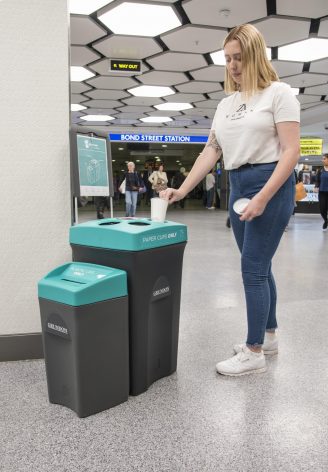 Grundon Waste Management has launched a dedicated paper cup recycling service aimed at helping to tackle the “mountain” of 2.5bn cups consumed annually in the UK.
Grundon Waste Management has launched a dedicated paper cup recycling service aimed at helping to tackle the “mountain” of 2.5bn cups consumed annually in the UK.
The new service tailored around the frequency of customer collections and the number of cups to be recycled. Grundon says this mean it can guarantee all its collections are certified CarbonNeutral®.
A new partnership with CupCycling by James Cropper, also means customers will be able to buy back paper made from cups which have already been recycled.
Once the clean paper cups are collected by Grundon, they are taken to its materials recovery facilities where they are processed and baled before being sent to James Croppers’ own paper mill.
There, the paper – which makes up around 90% of the materials in the cups – is separated and converted back into Forest Stewardship Council (FCS) certified paper fibre. The remaining 10% is made up of the plastic polymers from the polyethylene film, and is sent for reprocessing.
Customers can then buy back paper products made from waste paper cups, including 100% recycled 80gsm premium office paper.
“This is a win-win from both an environmental and financial perspective and we see this as appealing to a wide range of businesses and organisations who use disposable paper cups.”
Earlier this year, Grundon was one of the first waste collectors to partner with Costa Coffee when it announced its commitment to recycle half a billion takeaway cups a year.
Grundon director Bradley Smith, a member of the Executive Board of the Paper Cup Recycling & Recovery Group (PCRRG), says the move is an important one for the market.
“Finding the right solution for recycling paper cups has been high on Grundon’s agenda for some time and we’re confident this new service, which guarantees 100% recycling, provides the most flexible and sustainable offering available today,” he said.
“This is a win-win from both an environmental and financial perspective and we see this as appealing to a wide range of businesses and organisations who use disposable paper cups.
“We also know customers like the fact our fleet is certified CarbonNeutral®, which means our collections won’t impact on their carbon footprint. This, combined with the fact they have the option to purchase recycled paper products made from paper cups, provides a perfect example of the circular economy in action.”
West One Shopping Centre
One of the first customers to sign up is West One Shopping Centre, located in the heart of London’s West End near Oxford Circus. Centre manager, Cyrus Annan, recently took delivery of six new Grundon paper cup recycling bins.
The newly-refurbished centre, which relies on Grundon for all its waste management and attracts around 27m visitors a year, is home to such well-known names as McDonald’s, Marks & Spencer and Boots, plus a host of coffee and food outlets including Starbucks, Notes and Pret a Manger.
“We are passionate about sustainability and take recycling very seriously,” said Cyrus. “We are already zero waste to landfill, we segregate food waste and have a mixed recycling service, so the opportunity to step up a gear and introduce paper cup recycling by Grundon was a no-brainer.
“We have a significant number of outlets who serve coffee and other drinks in disposable paper cups so this move makes complete commercial sense for us and for our tenants.
“Most importantly though, this new service means we divert the thousands of cups that would have ended up in general waste, into recycling, so it really does tick all the boxes.”
Paper Cup Recycling Facts
- As a nation, the UK disposes of 2.5bn disposable cups every year – that’s 7m a day
- Paper cups are problematic to recycle because they are made of two materials – paper and the polyethylene film which is bonded to it. The bonding makes it difficult to separate the paper fibres from the film
- It is widely reported that less than 1% of those cups disposed of are currently recycled
- Only a few specialist recycling facilities have the technology to accept paper cups for recycling
- The majority of paper cups currently go into general waste, which means they are either disposed of via an Energy from Waste (EfW) facility, which generates energy, or they go into landfill
- Grundon can now recycle most polyethylene (PE) coated cups, coffee cups used by high street chains such as Costa and Starbucks, and cold cups, such as those used by McDonald’s for serving soft drinks and milkshakes
- To date, James Cropper has recycled more than 20m coffee cups through its facility, which has the capacity to upcycle 500m each year
- Waste paper cups are given a new life as a variety of paper products, for example, a ream (approximately 500 sheets) of 80gsm paper contains 46 cups.